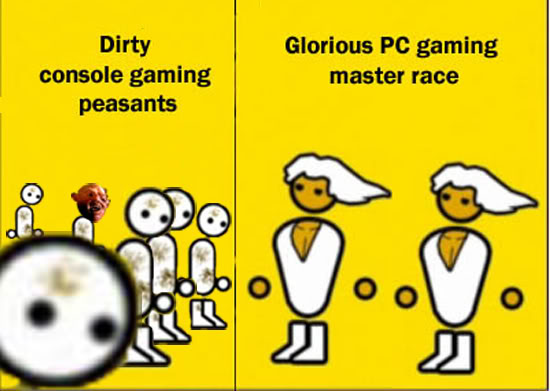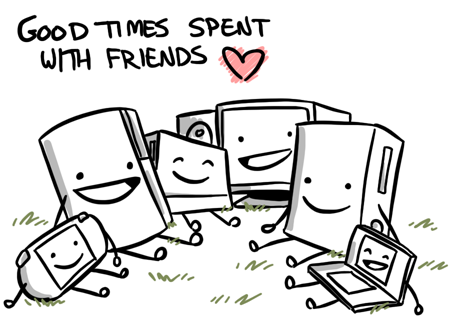Why can't we all just get along?
The gaming industry is in the middle of a civil war. Ever since the battle between the Amiga and the Atari ST, this "console war" has only become bigger and bigger. We treat E3 like the Iowa Caucuses, a determinate for who'd "win" next-gen. We look at sales numbers as if they were the number of medals each team had won in the Olympics. We secretly want our side to win, and all others to burn in flames for a we care.
Everyone here knows that I'm a Nintendo fan at heart, and somehow that has caused me to slowly become anti-Sony, despite the PS2 being one of my favorite consoles of all time. I know it's bad to want to hate Sony, but whenever I see a "Vita is dead" article or a bad review for a PlayStation exclusive, I can't help but chuckle to myself and laugh (indirectly) at Sony fans. But I have no reason to hate Sony... so why is that my alliance with Nintendo makes me do?
This is what I want to talk about today. The gaming industry is one of the most adversarial industries in the world. We may be the only industry with a "war" that is so interesting, it has its own Wikipedia page. We are all gamers, so why do we all hate each other so much?

This can only mean one thing: war.
As I mentioned before, I'm a Nintendo fan. I don't, however, go out and actively attack Sony or Microsoft. Honestly, I could care less if you love Uncharted or Halo more than Mario or Zelda. But there are many people out there that do. Go to a negative article about Nintendo, and you see Sony and Microsoft fans laugh at its "baby games." Go to a negative article about Sony and you see Nintendo and Microsoft point fingers at the Vita. Go to a negative article about Microsoft, and you can be pretty damn sure you'll see a few Kinect haters hanging around. And please, don't get me started on PC supremacists.
Our war doesn't end with the Big 3. Developers are constantly under fire. Yeah, EA and Activision are obvious targets, but so was Kamiya when Bayonetta 2 became a Wii U exclusive. We cheer when EA's online-only DRM backfired on them with SimCity. We bash on Activision for releasing the same game every year. We facepalm every time Square Enix announces a sequel to a spinoff of another spinoff remastered in HD that so happens to have the words "final" and "fantasy" in it.
And then we take our war outside the gaming industry, because clearly if Joe Biden wants to tax violent video games, he's a bad vice president (as if being vice president really means anything... ZING!).
Look at the lists above. Do gamers really benefit from any of these arguments? Is it really worth it to defame other gamers just so we can feel better about ourselves and our chosen company? Most importantly, will this war ever be over?
The answer to all of these questions is a definitive "no." And it's more than just due to "fanboyism."

Clearly.
We've all fallen prey to "post-purchase rationalization," otherwise known as "Buyer's Stockholm Syndrome." It's the idea that when people purchase an expensive item (i.e. a video game console) they refuse to look at the downsides of the machine in order to convince themselves that the purchase was worth it. We do this, unconsciously, to avoid buyer's remorse, which is why many of us so ardently support the console or consoles we own. It may also be the reason why I've turned from being against PC gaming to being totally for. Yep, I used to be one of those people who hated PC supremacists and would do anything to not be a part of them. But upon purchasing a pretty decent gaming rig of my own, why the hell would I oppose PC gaming now?
Another reason why we act this way is because all of us have something psychologists "choice-supportive bias," which can work both for and against our allegiances to a particular console manufacturer. In choice-supportive bias, we automatically defend the purchases we've made in the past because we choose only to remember the positives rather than the negatives. Many look back at the GameCube and wish Nintendo would go back to those days. In actuality, if we were to go back, we'd probably hate it; the constant software droughts, the hundreds of games that went to PS2 and Xbox but not the Cube, the terrible E3 where Pac-Man Versus (despite it being maddeningly fun) was the showcase item in Nintendo's presentation – do we really want to go back to those times?
On top of that, we're probably all influenced by a phenomenon known as "escalation of commitment," where over time, we are increasingly convinced that our decision to stick with the console we chose was the right one, despite the fact that you probably would have been happier if you hadn't stuck with that PlayStation Vita since launch. (Oops, here I go again!)
I guess the one thing you can take from this blog is the idea that gamers are very adversarial because, well, gaming is very expensive. You don't need hundreds of dollars to enjoy movies. You don't need hundreds of dollars to enjoy sports. But you do need a crapload of money to play games, and to that, we can all agree.
Of course, unless you're a PC gamer. (Damnit!)

Why can&#Array;t we all just get along?
So, I'm sure you've probably lost interest halfway through my post, but I want to know what you guys think. Why is it that gamers are so adversarial in nature? As always, speak your thoughts in the comments below.
![Amazing Spider-Man Finale Features New [SPOILER] Costume](../../../../../../assets1.ignimgs.com/2018/06/01/untitled-br-1527892808294_small.jpg)